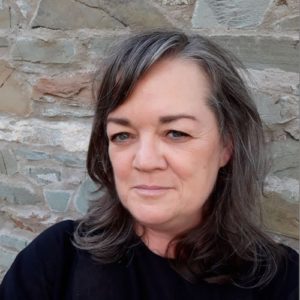Short cuts
by bookanista The judges of the 2020 Sunday Times Audible Short Story Award have winnowed down a shortlist of six from almost 1,000 entries. Louise Kennedy, who was shortlisted in 2019, makes the final round a second time, having since secured a two-book deal with Bloomsbury that will kick off with the collection The End of the World is a Cul de Sac in January 2021. She is joined by fellow Irish writer Niamh Campbell, Zambian Namwali Serpell, Alexia Tolas from the Bahamas, and American duo Shawn Vestal and Daniel O’Malley. Here’s a short taster from each of the shortlisted stories:
The judges of the 2020 Sunday Times Audible Short Story Award have winnowed down a shortlist of six from almost 1,000 entries. Louise Kennedy, who was shortlisted in 2019, makes the final round a second time, having since secured a two-book deal with Bloomsbury that will kick off with the collection The End of the World is a Cul de Sac in January 2021. She is joined by fellow Irish writer Niamh Campbell, Zambian Namwali Serpell, Alexia Tolas from the Bahamas, and American duo Shawn Vestal and Daniel O’Malley. Here’s a short taster from each of the shortlisted stories:
from ‘Granma’s Porch’ by Alexia Tolas
When Babou drop me off at Granma house, I don’t complain. This the first time I sleep on clean sheets in weeks. Plenty perks come with living with Granma. For dinner, Granma got steam sausage and rice. I don’t have to warm up no Chef Boyardee. Granma got Rich Tea cookies to dip in Milo. I ain’t eat this good since I come back to Long Island.
The floor always sweep and mop. Dishes wash. I don’t have to fight dust bunnies to get through the door or brush roaches off cups full of soda and cigarette ash. Mind you, Granma don’t let me louse all day, but at least I’s the child again. Babou say he only gone for a little while. I almost wish he don’t come back.
I got company living with Granma. Rico and Glenn live in Petty’s. Sade right behind us. Her mummy and daddy don’t need no excuse to send her by Granma. I know she’ll be sleeping by me every night. Granma play like she mad, like giving Sade some sausage and rice breaking her pocket, but when dinner time come, she looking all round for Sade saying food getting cold.
But the thing I love most bout living with Granma is I get to see the new boy. I meet him when we come for Sunday dinner. Babou was talking with Granma. Uncle Shane start bout how Babou abandoning me. Uncle Shane ain’t never like Babou. He had to move out our house when Babou move back in. That was four years ago, but he ain’t get over that yet. I gone outside on Granma porch so I don’t have to hear them row.
I feel safe out here on the porch. Granpa did love the sea so much, he build the porch right over the sound. This porch done seen me grow. When I was little, Granma did plait ribbons into my curls here every morning. Mummy would sneak up behind me and tickle me till I pee, then toss me into the sound to bathe. Me and Sade done skin enough knee tripping on this splintered wood. Everyone feel at home on Granma porch. Rico and Glenn just bout raise on it. I done seen every inch of they scrawny selves, more than I ever wan’ see.
I was on the porch when he walk over. Uncle Gully sent him to beg some oil for frying fish. When I see him, my heart catch fire.
 Alexia Tolas was born and raised in the Bahamas. Her writing has been featured in various literary journals, and in 2019, she won the Commonwealth Short Story Regional Award for the Caribbean with ‘Granma’s Porch’.
Alexia Tolas was born and raised in the Bahamas. Her writing has been featured in various literary journals, and in 2019, she won the Commonwealth Short Story Regional Award for the Caribbean with ‘Granma’s Porch’.
@AlexiaTolas
from ‘Love Many’ by Niamh Campbell
That November I had pressed against the deadweight of depression – of a broken heart, the post-broken-heart universe, ringing tepidly with rain – and downloaded Tinder. I went on a date with an American who said, I could put my hands around your waist, and then, when the wine list came, pointed at the wine list and squeaked, halfsies?
I went on a date with a man from Cork who had lived in Boston for one year and acquired an accent so accurate and bulletproof I could not believe he was really from Cork. This man also had a low lisp, which made much of what he said sound malevolent and sexually exciting. He rented an extraordinary apartment near the Peppercanister church, a section of converted townhouse with a ceiling that stood on columns of yellow plaster, scrunching at the centre to a vortex of snowy garlands: the sash window opened onto the fire escape and the Boston-Corkonian sat in a chair, smoking out of the window, holding forth. By two in the morning I felt exhausted and deranged by his strange monologues. I lay on my face and proceeded, for the rest of the night, to play dead.
I went on a date with a man who let me pay for both coffees and then said, I’ll get you back some time.
I went on four dates with a thought-tormented programmer from Saint Petersburg who was, he told me, looking for a wife, but could not understand how women worked. He had a graceful and melancholy physique, like an expensive instrument.
I went on dates with scrofulous Irish boys who had bags of laundry at the feet of their beds, one bar of Palmolive soap in the shower tray.
I went on dates with imported Google and Facebook workers at Grand Canal Dock, goofy Italians and sardonic Georgians and play-fighting French. They knew about cheese and collecting vinyl and seemed so absurdly uncomplicated I could not find a use for them.
I went on a date with the editor of an anti-establishment magazine who chided me when I told him I had just bought tea for a homeless man. The homeless man had looked at me and said, in a whine of wet ts, could you not get me some sweets?
I went on a date with a nice man I kept meeting at plays afterwards. Only ever plays.
And then, I went on a date with Timothy.
 Niamh Campbell is from Dublin. Her debut novel This Happy (June 2020) is published by Weidenfeld & and Nicolson.
Niamh Campbell is from Dublin. Her debut novel This Happy (June 2020) is published by Weidenfeld & and Nicolson.
Read more
@CampbellNiamh
from Simon by Daniel O’Malley
Marcy, my wife, is quiet. She rarely smiles. Days go by with no contact at all. Still, I have trouble imagining that she is truly unhappy. When she cries, it seems less about emotion and more like drainage.
For years we talked about having children. But things were always happening. The phone would ring, for example. Or the commercials would end. Or suddenly one of us would become hungry, and so the conversation would pause. At some point we stopped talking about it. We decided, I think, to just see what happened, which is to say we quit with the usual precautions. What happened was we continued to not have any children.
Our life isn’t complicated. Marcy is forty-four. I’m forty-one. She was married once before, when she was twenty-three. For some reason she was living in Kansas. We have money now, and a house. The house is closer to the highway than we’d like it to be, but with the trees all around you can sometimes forget it’s there. Marcy’s father chose the property. It used to be a tree farm – spruce, white pine, cedar, all organized by type, in what feels like a sort of checkerboard arrangement. He bought it, and then he died, but not before insisting that we live here – he was dying even as he said this, he was medicated. But we listened. I’ve thought about hiring a pilot to see what it looks like from above, but I haven’t done more than think about it. I drive nearly an hour each way to work. And the trees keep growing, larger already than they were ever intended to be, the branches tangling into each other in places. We’ve considered selling them, but then we’d have all these stumps. Unless they’d cut out the stumps, too. But then we’d have the highway. In the middle of it all, surrounding the house, are four acres of open grass. I keep it trimmed with a tractor. Marcy’s father bought the tractor too, and the mower I tow behind it. If I knew how to weld, I would rig a sun shade over the seat. Instead, Marcy bought for me a large straw hat.
I hadn’t cut the grass in weeks when Simon appeared. I remember seeing him step out from the trees, the grass nearly reaching his shorts. We were out on the porch, Marcy and I, drinking tea, not talking, but we were together, and then there he was.
 Daniel O’Malley grew up in Missouri and currently lives in West Virginia, where he teaches in the English Department at Marshall University. His fiction has been published widely, including in Granta, where this story first appeared.
Daniel O’Malley grew up in Missouri and currently lives in West Virginia, where he teaches in the English Department at Marshall University. His fiction has been published widely, including in Granta, where this story first appeared.
from ‘Sparing the Heather’ by Louise Kennedy
Each time she came it felt less like her house. There was a pot soaking on the hob, a dark mealy ribbon peeling away from its sides, the dregs of a stew of lentils or beans; Hugh only ate meat he had killed himself. The kitchen dresser had been rearranged. She had left ornaments behind, things she neither liked nor used. A pair of glass candlesticks, an Aynsley china vase. Six dark blue pottery wine goblets too heavy to drink from. A pewter ashtray. Hugh had moved them aside and they were in hasty clusters in the corners of the shelves. There were photographs in their place, faded Polaroids in assorted frames.
The kitchen table was covered with sheets of newspaper. Hugh’s shotgun was dismantled on the pages: barrel, shaft and fore-end laid out neatly, the cleaning paraphernalia less so. There were twisted rags, a roll of blue paper towels. Brass-tipped mahogany rods and its attachments: a couple of jags, a phosphor bronze brush, a tiny wool mop. An open can of lead and copper solvent that smelled like pear drops, a closed can of gun oil. The rent was in an envelope on the dresser. Mairead put it in her bag and went down the hall to Hugh’s room.
Normally the dog rested his chin on the bed and waited. Today he was agitated, skirring about the room. He was a wire-haired fox terrier called Arthur, with a coarse beard and eyes that watered like an old man’s. As Hugh finished, Mairead felt a tongue across the sole of her foot.
Bloody dog, she said, wiping her heel on the sheets.
Hugh’s thigh was lying heavily across her hip and she had to push him off to get up. He switched on the bedside lamp and watched her dress. She turned away. She hated the silvery pucker of her stretchmarks, how flat her tits looked without the chicken fillets she put in her bra. The papery slump of her skin. Not that he seemed to mind. He was always looking at her, leaving the light on so he could see what he was doing, watching as he put himself inside her.
I can give you a lift up the road, he said.
Will you fuck. I’ll see you later on.
She left the house through the back door.
 Louise Kennedy grew up in Holywood, Co. Down. Her writing has been published in journals including Banshee, The Tangerine, Stinging Fly, the Irish Times and Belfast Telegraph. She lives in Sligo. Her story collection The End of the World is a Cul de Sac and novel When I Move to the Sky are forthcoming from Bloomsbury. Her story ‘In Silhouette’ was shortlisted for the 2019 Sunday Times Audible Short Story Award.
Louise Kennedy grew up in Holywood, Co. Down. Her writing has been published in journals including Banshee, The Tangerine, Stinging Fly, the Irish Times and Belfast Telegraph. She lives in Sligo. Her story collection The End of the World is a Cul de Sac and novel When I Move to the Sky are forthcoming from Bloomsbury. Her story ‘In Silhouette’ was shortlisted for the 2019 Sunday Times Audible Short Story Award.
Read more
@KennedyLoulou
from ‘Take It’ by Namwali Serpell
Yeah. So, this was back when he was scrounging around between Berkeley and Oakland, the borderland there like a tease. He was fourteen then, still a yard rat, still garbage diving with Adeline. He was tall for his age but she was taller. Skinnier, darker. She taught him to check the recycling bins first: if there were scraps, at least they’d be contained. Less rotten.
Adeline. She said her name with the hauteur of a drag queen, eyelashes swooping down and brushing back up like palm fans for the Queen of Sheba. But she got it from a street sign, because she was always hanging round that one corner by Ashby BART. She’d stand there in her garbage-bag poncho, with her 7-Eleven cup. (She’d caught him pissing in it once and nearly torn his earlobe off.) She’d hold it straight ahead, chanting at the commuters. Care to share care to share care to share. Cheerful in its way. Sometimes he’d find her squatting on the sidewalk, clothes torn, blood strung over her thighs and crudding her nails. Whimpering. Could somebody help could somebody could somebody. Just another kind of song, but it spooked him.
It was like everybody around there was inside out. Bedrooms laid out in storefronts, bathrooms where-the-fuck-ever. The crazy you’re supposed to keep inside always on the verge of bubbling out. The townies were saner but hella snooty. Mostly white – or tattoo-gray – sprawled on the sidewalk outside Rasputin or Amoeba, playing their own music on boomboxes, leering at the Cal students skittering past. He limited his dealings with them to weed and made survival alliances with the older folk. Lox, who lived in the cave of the Berkeley BART stairwell. Black Jesus on Sproul. Mexican Jesus on Bancroft. Adeline.
At night, he’d peel away from her and sneak alone into this spot on Stuart Street. The back garden was overgrown. Lofty grass, wildflowers, an apple tree in the corner pummelling a shed with fruit. There was a ruin of a brick oven in the middle, framed by two cacti that looked like an old couple: a thin man with reaching limbs and a fat woman with spiky curves, both tangled with spiderwebs that aged them. The house itself was being renovated. When the sun fell, he would hop the rickety back gate and camp out next to the oven, its bricks still warm from the day.
 Namwali Serpell is a Zambian writer who teaches at the University of California, Berkeley. Her story ‘Muzungu’was selected for The Best American Short Stories 2009 and shortlisted for the 2010 Caine Prize for African writing, which she subsequently won in 2015 with ‘The Sack’. Her debut novel The Old Drift is published by Hogarth (March 2020).
Namwali Serpell is a Zambian writer who teaches at the University of California, Berkeley. Her story ‘Muzungu’was selected for The Best American Short Stories 2009 and shortlisted for the 2010 Caine Prize for African writing, which she subsequently won in 2015 with ‘The Sack’. Her debut novel The Old Drift is published by Hogarth (March 2020).
Read more
@namwalien
from ‘Teamwork’ by Shawn Vestal
Coach says we are the sorriest bunch of lazy-ass motherflippers he’s ever seen in shoulder pads. If we don’t start acting like we want to win, he doesn’t know what’s going to happen. Coach says we must be a team – twenty-six boys, all on the same page. Coach says we have to execute. If every one of us would just execute, there’s no reason on the gol-dang planet every play shouldn’t go for a touchdown. But no. We don’t execute. Not us.
It’s halftime at the Declo game. We are in the locker room. We are five points down.
He says, “Maybe some of you guys don’t need to be out there anymore.” He says, “Maybe some of you prima donnas need some time on the bench.” He says, “Try me. Just try me.” Red in the face, he waves his arms around like he’s being attacked by bees. He says, “You gotta get out there and fuck-dang hit somebody!”
He throws his clipboard against the wall and stomps out.
Everyone relaxes. Charles Qualls III hands out speeders – tiny white pills he orders from a magazine. Everyone treats them like they’re cocaine or something, like it’s doing drugs, like Charles is a drug dealer, but they’re just caffeine.
Still, they get you up.
Cleats clapping on the concrete, Charles mutters, “Speeder? Speeder, dude?” as he walks past each of us. Our quarterback, Jason Ashman, is sitting on the bench and praying. He doesn’t look up. He doesn’t take a speeder. He leans forward, elbows on knees, hands clasped, head bowed between his hulking shoulders, asking God to help us win.
With 3:42 left, Charles Qualls III takes a swing pass from Jason Ashman out in the flat, stops in his tracks as the cornerback flies past, and runs twenty-four yards into the end zone, right onto those big orange Declo letters – HORNETS. The little bank of home-team bleachers goes quiet, while the even smaller bank of visiting-team bleachers sends up its puny cries of elation into the night, drifting into the atmosphere of cow shit and cut hay.
We hold them on their next possession and win; and thus we, the 1983 Gooding Senators, the pride of Idaho’s Magic Valley Conference, the smallest eleven-man farm-town league in the state, take our record to 1-2.
 Shawn Vestal is the author of the novel Daredevils, the short-story collection Godforsaken Idaho, and A.K.A. Charles Abbott, a short memoir. He lives in Spokane, Washington.
Shawn Vestal is the author of the novel Daredevils, the short-story collection Godforsaken Idaho, and A.K.A. Charles Abbott, a short memoir. He lives in Spokane, Washington.
shawnvestal.com
@vestal13
The Sunday Times Audible Short Story Award is the world’s richest and most prestigious prize for a single short story, with the winner receiving £30,000 and the five other shortlisted writers £1,000 each. The award accepts entries of 6,000 words or under published in English from authors from anywhere in the world who have been published in the UK or Ireland. 2020 has seen 983 eligible entries, from 48 countries, with all continents barring Antarctica represented.
The 2020 judging panel comprises novelist and short-story writer Carys Davies; prize-winning author Diana Evans; novelist and screenwriter David Nicholls; short-story writer and novelist Romesh Gunesekera and The Sunday Times’ Literary Editor Andrew Holgate. The winner will be announced on 2 July.
Previous winners of the award include Pulitzer Prize-winning American authors Junot Díaz, Anthony Doerr and Adam Johnson as well as Chinese-American novelist Yiyun Li, C.K. Stead from New Zealand, Jonathan Tel from the UK, Kevin Barry from Ireland, and Bret Anthony Johnston and Courtney Zoffness from America. The 2019 winner was Ireland’s Danielle McLaughlin.
As sponsor of the 2020 Award, Audible will produce an audio anthology of the shortlisted stories later in the year. Ahead of the prize announcement, the stories are being published in full on the Sunday Times Audible Short Story Award website.
www.shortstoryaward.co.uk
@ShortStoryAward

